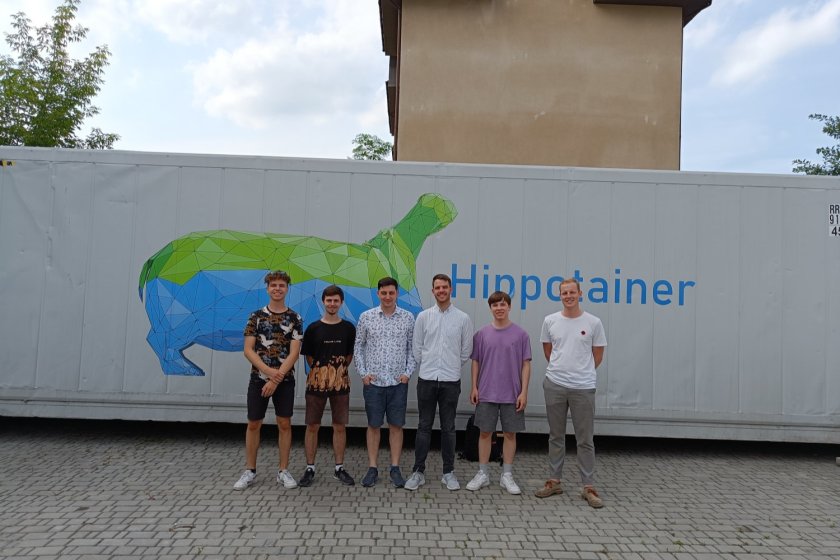
category_news
Wageningen start-up produces fresh vegetables in a shipping container in Ukraine
Tijmen Blok and Jort Maarseveen decided to launch their own start-up after graduation. Together, they designed and built the Hippotainer, a vertical farm in a shipping container. Their first Hippotainer is now churning out hundreds of heads of lettuce per week in war-torn Ukraine.
Jort Maarseveen (26) studied Biobased Sciences in Wageningen, where his interest in vertical farming was sparked. Tijmen Blok (26), who studied Aquaculture and Marine Resource Management, shared his enthusiasm. Together, they sought small-scale applications of vertical farming. Their quest was not a straightforward one, Blok recounts. ‘Our initial experiments used polystyrene with holes and a pond pump for water circulation. After a while, all our plants perished. The lighting had elevated the temperature to over 40 degrees Celsius.’
The idea of building the vertical farm in a shipping container emerged during their experiments. Maarseveen: ‘We were looking for a system that could be moved easily. In that sense, a shipping container is ideal; it can easily be put on a truck. Once on location, it can be deployed swiftly, requiring no buildings or permits. This enables it to instantly make an impact. In particular where conventional farming methods are difficult to implement.’
Handing out lettuce and basil
The Hippotainer was born. Blok and Maarseveen took out a loan to buy a second-hand cooling container, which they were able to store on the parking lot of a horse-riding centre in Bennekom. Intern Joël van Schoonhoven, a student at Twente University, helped in the design, and together they constructed the first prototype.
Inside the Hippotainer, vegetables are grown in five layers. Each layer has rafts with plants, their roots dangling in the water. The water circulates through the system, ensuring that barely a drop is wasted. Sensors control all the growth factors: irrigation, temperature, humidity, nutrients and more.
- Unfortunately, your cookie settings do not allow videos to be displayed. - check your settings
Blok says the yields from the first attempts at growing leafy greens were enormous. ‘We produced more vegetables than we could use. We donated hundreds of heads of lettuce a week to the Food Bank and to students attending our student club’s member’s meeting. Our friends were given as much basil as they could use.’
In the bomb shelter
Blok and Maarseveen’s work attracted the attention of an organisation in Ukraine, which saw the Hippotainer’s potential. Although there is no shortage of food in most of the country, Ukrainians have lacked nutrients and vitamins since the Russian invasion. Additionally, the customer sought a way to offer internal refugees work, preferably in food production.
Thus, the very first Hippotainer made its way to Ivano-Frankivsk, a town in West Ukraine, by truck in June 2023. Block and Maarseveen followed by air to Poland, driving the rest of the way. They trained a team of refugees in the practical use of the Hippotainer and provided the required knowledge on topics such as photosynthesis and nutrients and how to sell products.

It was an adventurous week, according to Maarseveen. ‘The air raid sirens sounded on half of the nights, which meant we had to go to the shelters under a theatre. Tijmen slept right through the sirens; we had to pound his door to wake him.’ Blok would have preferred to remain in the hotel: ‘The locals barely react to the sirens anymore. At one point, it was just us and one other foreigner in the shelter.’
Islands and deserts
The Hippotainer in Ivano-Frankivsk is currently in full production, providing local markets and restaurants with lettuce. Blok and Maarseveen are working hard to bring their creation to other parts of the world. Their container can provide solutions in places where conditions to grow vegetables are unfavourable due to supply issues, water shortages or poor soil quality.
Not just areas in crisis but also islands, northern regions with a lack of daylight, or arid, warm regions. Maarseveen: ‘Saudi Arabia and the Emirates focus on developing their agricultural sector. At present, they are barely able to sustain themselves, and many vegetables must be imported. That is where we see opportunities.’